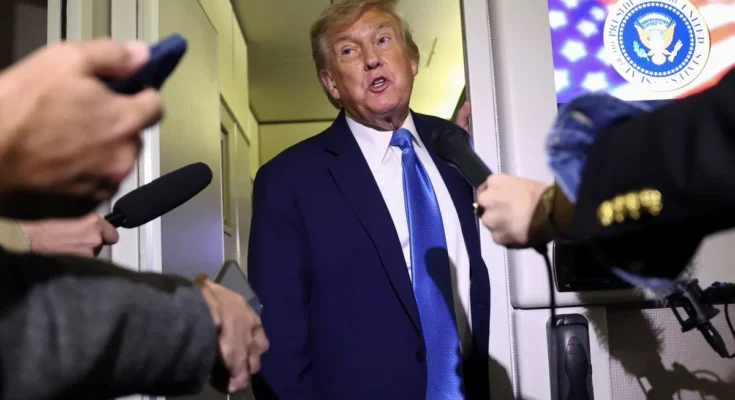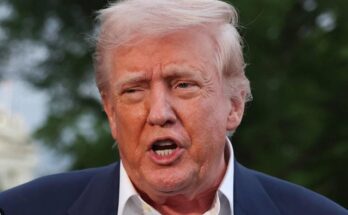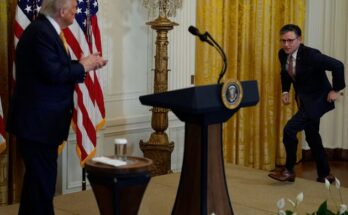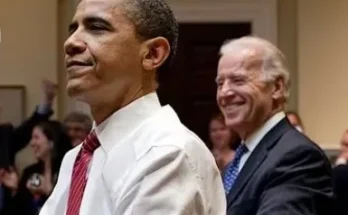Donald Trump’s White House even now contains staffers convinced he is unfit to be president, a former senior administration official who famously spoke out anonymously about such concerns during Trump’s first term said.
“If I was sitting with Donald Trump right now, I would say, ‘I have friends in your White House, and some of them are … laying very, very low, but share some of the same concerns that I had during the first Trump administration,’” Miles Taylor said.
Those concerns, Taylor said, were that Trump “is still the same man, but worse and emboldened, still deeply impulsive, but impulsive without checks and balances around him.”
Taylor was speaking to the Clinton adviser turned Lincoln biographer Sidney Blumenthal and the Princeton historian Sean Wilentz on their podcast, The Court of History.
Taylor was chief of staff in the Department of Homeland Security when he wrote the September 2018 op-ed for the New York Times saying he was “part of the resistance” to Trump, a group of senior officials concerned that the president was not fit to govern and dedicated to checking his wilder impulses.
The piece was published under the byline of “Anonymous,” as was a subsequent book, A Warning. The publication stoked intense speculation as to who the writer was. Taylor identified himself shortly before the 2020 election — and became a hate figure for Trump and his followers.
Returned to power, Trump recently signed an executive order suggesting Taylor may have committed treason and ordering an investigation.
This month, Taylor filed a legal complaint, calling for federal watchdogs to investigate such retaliation against him.
Trump was widely reported to have been stopped from numerous extreme actions in his first term by so-called “adults in the room” appointed to key roles, such as Defense Secretary James Mattis, a highly respected former U.S. Marine Corps general. In Trump’s second term, surrounded by loyalists such as Fox News host turned Defense Secretary Pete Hegseth, the president is not seen to be subject to any such constraints.
Taylor told Blumenthal and Willentz: “The people around [Trump] aren’t trying to talk him out of doing bad things — if anything, they are demonstrating fealty at every turn to the leader, and that’s resulting in a lot of bad decisions getting made.
“Now, most of the folks I know are on, of course, the national security side of the [White] House, and some of them still think that they can keep their hand on the wheel. And I would prefer some of those people in the posts I’m thinking about than others who might replace them. But I think people of conscience in this administration know that they are an endangered species.”
As described by Wilentz, that is because Trump operates less as a traditional president than as an absolute monarch crossed with a mobster: “John Gotti meets Louis XIV.”
That remark prompted laughter, but straight faces prevailed when Taylor described the immense power enjoyed by Stephen Miller, the White House deputy chief of staff widely seen to be the most influential presidential aide, particularly in implementing ultra-hardline immigration policy.
Taylor said Miller’s power was “almost absolute,” though Miller himself “would never say that.”
“Stephen is very, very careful to always be entirely deferential to the president,” Taylor said, “but I can tell you, I remember when … I think it was 2018 … Stephen was growing frustrated, and he convinced the president, effectively, at the time to put him in charge of broader homeland security policy for the administration.
“It wasn’t some public announcement, but he’d gone to the president and said, ‘Look, I’m tired of this … basically give me the authority to make some of these decisions over at DHS and essentially override the department.’
“And he called me to tell me this. I remember where I was. I was driving on Capitol Hill, and it was the words he used that stuck with me. He said, ‘Think of this as my coronation.’ That’s what he called it. He called it his coronation, that he’d gotten the president to empower him to take on these new duties.”
According to Taylor, “that was, I think, the most revealing thing that I ever heard come out of [Miller’s] mouth. And Stephen, you rarely get these unguarded moments with him. He’s extremely guarded. And that was sort of an unguarded moment from him, but I think illustrative of not just where his head is at, but also how this administration … thinks of governance not in terms of democracy and checks and balances, but how can you consolidate total rule?
“And so Steven certainly has that inside this administration, he’s got much more authority than he had before. And you are seeing what that looks like if left unchecked, right up into these military deployments” in Los Angeles” against protests over deportations by Immigration and Customs Enforcement.
“That’s got Stephen Miller’s fingerprints all over it,” Taylor said, adding that Miller had effectively relegated Kristi Noem, the Secretary of Homeland Security, to little more than a “PR role.”
Asked if it would be fair to think of Miller as effectively Trump’s “co-president,” Taylor said “that might be a bridge too far, and Steven would never promote that notion.
“You know, he knows all of his authority is derived from the president. And I think he’s probably the only person, I mean this genuinely … I’ve ever engaged with at the White House that never showed daylight with the president. There was never a private meeting where Steven said, ‘This f––––g guy has no idea what he’s doing.’
“But almost everyone else I engaged with, the biggest names to the no-names, would have that conversation in private: total frustration with the president, recognition of who he really was. But Stephen, in private, wouldn’t even show you that he thought the president was what everyone knows him to be.”



